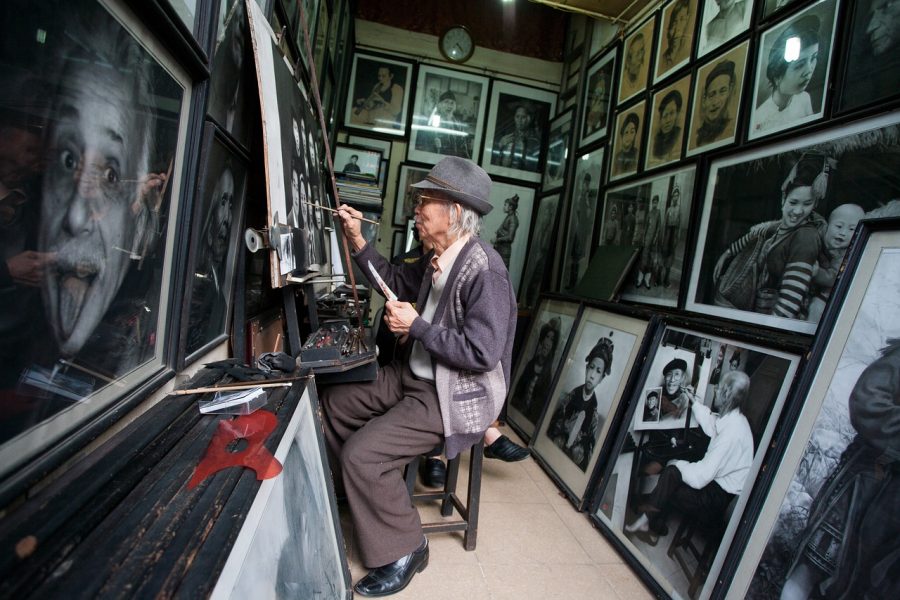Art Can’t Be Separated From The Artist
December 7, 2021
When artists make controversial or hateful comments, it makes you rethink your original impression of them. Even if you aren’t the target of their criticism, when hearing those comments, or seeing those actions, what do you do? Continue to listen to their music? Consume their content? Or do you completely stop?
Some people completely stop consuming content from that artist. Others are able to ignore the comments or actions, and make peace with it. Those that choose the latter often claim to ‘separate the art from the artist’. But is that really possible? Art is something so personal, and quite often, the artist gains revenue from their art. The artist also technically owns their art, so you literally can’t separate the two.
For example, in 2022, the Brit Awards decided they would remove male and female prizes in favor of gender-neutral awards. In response, the lead guitarist of Queen, Brian May, was quoted as being opposed to this decision.
Organizers said they wanted to reward artists “solely for their music and work, rather than how they choose to identify or as others may see them, as part of The Brits’ commitment to evolving the show to be as inclusive and relevant as possible.”
A number of artists, including Sam Smith, fought for this decision. They have been calling on the organizers to move away from gendered categories.
However, May said that the decision was “made without enough thought.”
May was also quoted making comments against diversity in modern culture. In his opinion, Queen wouldn’t have been considered diverse enough in the modern age.
“We would be forced to have people of different colours and different sexes and we would have to have a trans [person].” May said to the Daily Mirror. “You know life doesn’t have to be like that. We can be separate and different.”
May attempted to explain the situation in an Instagram post.
“Yes—I was ambushed and completely stitched up by a journalist at the recent ITV event.” May said. “And it’s led to a whole mess of press stories making it look like I’m unfriendly to trans people. Nothing could be further from the truth. My words were subtly twisted.”
“Sincere apologies to anyone who has been hurt by the stories. My heart is open as always to humans of all colours, all creeds, all sexes and sexualities, all shapes and sizes—and all creatures.”
I agree with the general consensus of forgiving May. Maybe I’m too trusting of him, but he has always seemed to be friendly to the LGBTQ+ community in the past. But of course, there are plenty of other examples that shouldn’t be tossed aside so easily.
Eric Clapton, the infamous English guitarist of Cream, The Yardbirds, and Derek and the Dominoes, has also said some very alarming things. In 1976, Clapton interrupted a concert with his iniquitous racist rant. He first advocated his support for Enoch Powell, a politician well-known for his anti-immigration views. He then asked the audience if there were any immigrants present.
“I don’t want you here, in the room or in my country,” Clapton said. “Listen to me, man! I think we should vote for Enoch Powell. Enoch’s our man. I think Enoch’s right, I think we should send them all back.”
If you can imagine, it only got worse from there. Later, Clapton merely dismissed these comments.
“I thought it was quite funny, actually,” he said in October 1976. “I don’t know much about politics. I don’t even know if it would be good or bad for him to get in. I don’t even know who the prime minister is now. I just don’t know what came over me that night. It must have been something that happened in the day, but it came out in this garbled thing.”
In 2018, he finally apologized, still adding that he found his racism “funny”.
“I was so ashamed of who I was, a kind of semi-racist, which didn’t make sense,” Clapton said. “Half of my friends were black, I dated a black woman and I championed black music. I’m not excusing myself, it was an awful thing to do, I think it’s funny, actually.”
Personally, after discovering these comments I didn’t feel right listening to Clapton anymore. Supporting an already rich, racist, white man felt immoral. Especially when something like music is so personal and close to the artist.
Keeping in mind that music is something personal for the artist, we can assume that Clapton’s anti-lockdown song is something dear to his heart. Clapton teamed up with Van Morrison over lockdown to make the song “Stand and Deliver”. Rolling Stone reported that Clapton even “allegedly lent a van to a British rock band that [continued] to perform live music throughout the U.K. as a protest against lockdown measures.”
Even after all that, people will still listen to Clapton. Everyone has different opinions and morals; people will continue to consume the content they want. But if you’re going to listen to these artists it’s your job to acknowledge their faults. Personally, I also like to make sure they don’t get any money from my streams or listening.
There’s really no getting away from immoral artists, from Quentin Tarantino to Malcolm Young—they’ve all done something. Especially if you enjoy older artists, no matter who they are, it’s practically guaranteed that they’ve done something bad.
In my opinion, there’s really no separating the art from the artist. Art is something personal. Even if the artist dedicates their song, movie, painting, ‘to the fans’ it’s their creation. You can’t separate the artist from something that was born in their mind. It will always be that specific person’s creation.
In the end, people will listen to whoever they want, watch whatever they want, but you can’t separate the art from the artist.
Photo Courtesy of PIXABAY.COM

